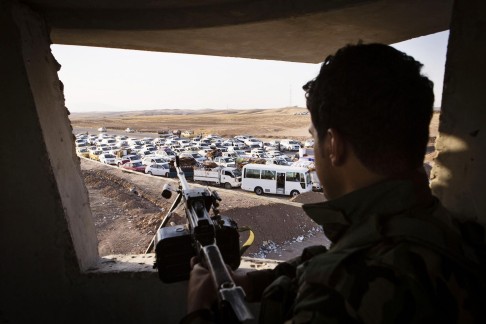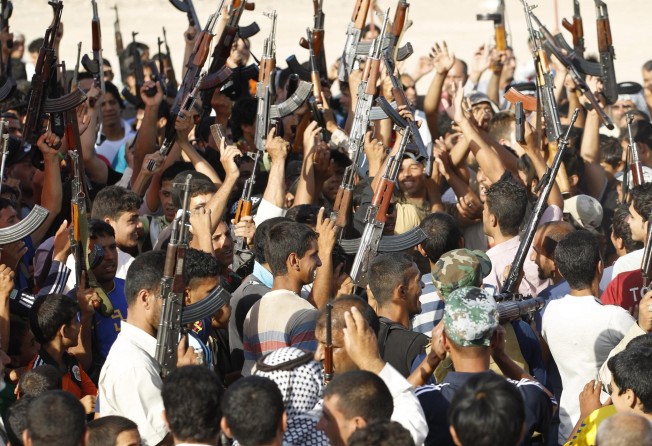
US considering air strikes and working with Iran to stop ISIL in Iraq
White House weighing cooperation with old foe Tehran to bolster Iraqi government against ISIL militants, as Iranians say they're ready to listen

The United States could be willing to talk with Iran to help Iraq's Shiite-led government combat a Sunni Islamist insurgency threatening to engulf the country.
"We're open to discussions if there is something constructive that can be contributed by Iran, if Iran is prepared to do something that is going to respect the integrity and sovereignty of Iraq," Secretary of State John Kerry told Yahoo! News.
Militants from the Islamic State of Iraq and the Levant have routed Baghdad's army and seized the north of the country in the past week, threatening to dismember Iraq and unleash all-out sectarian warfare. Joint action between the United States and Iran to help prop up the government of their mutual ally would be unprecedented since Iran's 1979 revolution, demonstrating the urgency of the alarm raised by the lightning insurgent advance.
Earlier yesterday, a senior US official said there could be talks between officials from the United States and Iran, which is also majority Shiite, on the sidelines of other talks in Vienna this week.
Kerry also warned that Washington is considering air strikes to help the Iraqi government fend off the Islamist insurgency.
Asked about the possibility of such strikes, Kerry said told Yahoo! News: "They're not the whole answer, but they may well be one of the options that are important."
He added: "When you have people murdering, assassinating in these mass massacres, you have to stop that. And you do what you need to do if you need to try to stop it from the air or otherwise." Kerry's comments come as the United States weighs its possible response to the conflict as militants from the Islamic State of Iraq and the Levant, or ISIL, continues their fierce onslaught across Iraq.
In the interview, Kerry called Iraq a strategic partner in the Middle East and said the United States was "deeply committed to the integrity of Iraq as a country".
"It is vital, ultimately, to the stability of the region as a whole," he said.
Kerry also called on the government of Nouri al-Maliki, Iraq's Shiite prime minister, to be more inclusive to various sectarian groups but stopped short of calling for his resignation, saying that was up to the people of Iraq.
"I don't think the United States should be issuing instructions or orders. I don't think any country should," he said.
"We are adamant that Prime Minister Maliki and his government must do a better job of reaching out to all the representative entities in Iraq and bring them to the table. That has not happened sufficiently," Kerry said.
The United States has also increased security at its embassy in Baghdad and evacuated some personnel, and Kerry yesterday said he did not think that ISIL would be able to take over the key city of Baghdad, at least in the near term.
"But that remains to be determined by the decisions that are made in the course of next few days," by the United States, Maliki's government and others, he added.
"I'm absolutely convinced we have the security we need for our embassy," Kerry said.
His remarks came a day after Iran's President Hassan Rowhani made a surprise announcement that Tehran may consider cooperating with Washington to fight the Sunni militants in Iraq.
President Barack Obama said on Friday ruled out sending US troops back into combat in Iraq to combat ISIL.
The US left the country in 2011 after a bloody, costly war that lasted more than eight years.
If Washington does decide to hold talks over Iraq with Iran, it is not clear where or how those talks would take place.
Additional reporting by Agence France-Presse, The Guardian
ISIL jihadis take another Iraqi town
Islamist militants captured another major town in northern Iraq, forcing hundreds of families to flee into the surrounding desert as their country descends into a new round of bloodletting.
The fall of the religiously mixed town of Tal Afar to the Islamic State of Iraq and the Levant (ISIL), an offshoot of al-Qaeda, raises the spectre of deepening sectarian violence. It came as the US government said it was reducing staff at its embassy in Baghdad.
This is the first time since the US-led invasion in 2003 that the embassy has decreased its staffing levels in response to a threat posed by violence. The move was an indication of the level of concern that the unrest could reach even into Baghdad's fortress-like Green Zone, where members of the Iraqi government also reside.
A separate Pentagon statement said "a small number" of Defence Department personnel were being sent to augment security at the facility.
Chaos erupted a week ago when ISIL militants swept unopposed into Mosul, Iraq's second city, in the country's north, then advanced rapidly to within 100km of Baghdad, scattering Iraqi security forces in their wake.
Some diplomats will be relocated to the US consulate in Basra to the south, others to the consulate in Abil, in the northern Kurdistan region; and some to Amman, Jordan, the statement said. The embassy in Baghdad would remain open, it said.
The Obama administration has sent an aircraft carrier to the Persian Gulf as it decides how to respond to the crisis, which threatens the stability of the entire Middle East.
In Baghdad, Major General Qassim Atta, a military spokesman, said the government had reasserted control over much of Salahuddin province, and he showed a video of what he said were successful air strikes on the town of Balad in the region. All together, 278 people had been killed by the air force in the past 24 hours, he said.
But the capture of Tal Afar, a town near the Syrian border with a large population of ethnic Turkmens, many of them Shiite, suggested that the ISIL onslaught was continuing.
The Washington Post